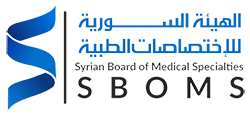The Syrian Board of Medical Specialties (SBOMS) is proud to announce the publication of a research study in the Avicenna Journal of Medicine. This study highlights medical innovations in the treatment of rare cases under challenging healthcare conditions. This achievement reinforces SBOMS’s role in supporting medical research that contributes to improving healthcare for patients in Syria.
The study was conducted by a distinguished medical team, including Dr. M. Netfagi, Supervisor of Resident Physicians, Dr. Mahmoud Hariri, Member of the Board of Directors and member of the Scientific Council of General Surgery Board, and Dr. Ula Abara, Member of the Scientific Council for Internal Medicine, alongside a group of researchers. Each member played a significant role in diagnosis and treatment, reflecting the collaborative effort between different medical specialties.
The study focused on a case of a woman in her fifties who was admitted to a hospital in Northwest Syria, suffering from a painful mass in the right gluteal region. Upon diagnosis, a large hydatid cyst was discovered. Another hydatid cyst was also found in the liver during surgery and was treated using the PAIR technique (puncture, aspiration, injection, and re-aspiration) along with albendazole.
The main innovation in this case was the use of the PragmaVAC device, a manual negative pressure wound therapy device. The device successfully closed the wound within just seven days, significantly reducing the risk of infection and complications. This device is a valuable addition for treating cases in resource-limited environments, as it demonstrated its effectiveness in improving treatment outcomes under such conditions.
The study’s key recommendations included:
- The importance of accurate diagnosis in rare cases of subcutaneous hydatid cysts, which may not immediately be considered in the differential diagnosis. Physicians are advised to include these cases in clinical evaluation, especially in regions where hydatid disease is prevalent.
- Innovation in using simple medical devices like PragmaVAC in resource-limited areas. The study demonstrated how such devices can make a significant difference in improving healthcare and reducing treatment time.
The Syrian Board of Medical Specialties extends its heartfelt congratulations to the researchers for this groundbreaking achievement and looks forward to further research that supports the advancement of healthcare and medical innovation in Syria. We hope this achievement will encourage international medical collaboration and the adoption of innovative treatment methods to improve patient outcomes.
